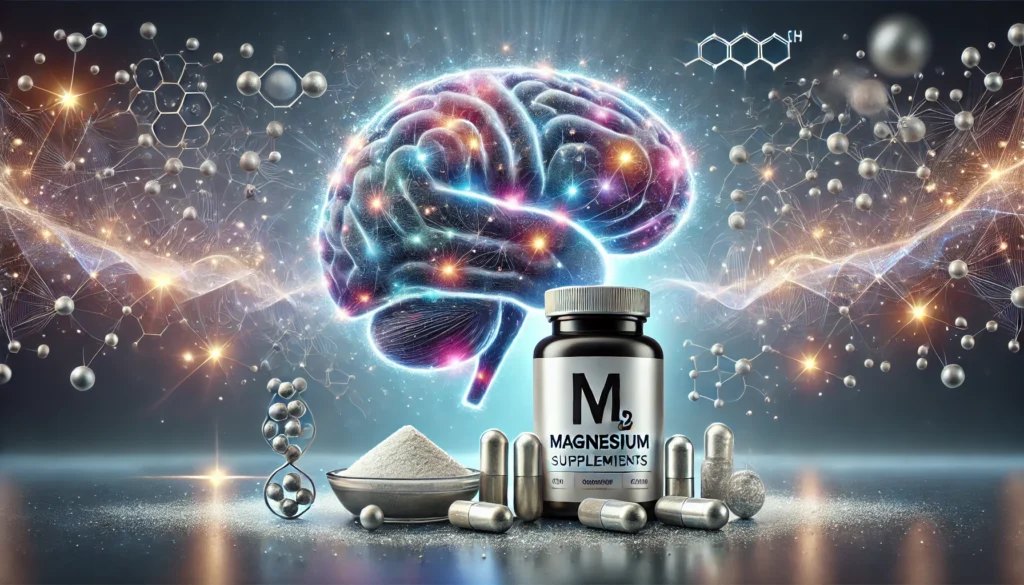Magnesium is an essential mineral critical for numerous biochemical processes in the body, including neurotransmitter release, energy metabolism, and DNA synthesis. As a vital nutrient, magnesium’s functions extend to maintaining bone health, muscle function, and cardiovascular stability. Recently, interest has grown around magnesium’s potential as a nootropic—a substance that supports or enhances cognitive function. This article explores magnesium’s scientific foundations, physiological mechanisms, possible nootropic benefits, dosage guidelines, side effects, interactions, and other essential considerations for safe supplementation.
You May Also Like:
Sources of Magnesium
Magnesium is abundant in both plant- and animal-based foods, making it accessible through a well-rounded diet. Key dietary sources of magnesium include:
- Green Leafy Vegetables: Spinach, kale, and chard are among the most magnesium-rich plants, providing around 150-250 mg per cup.
- Nuts and Seeds: Almonds, cashews, and pumpkin seeds are high in magnesium, with about 80-150 mg per ounce.
- Whole Grains: Foods like brown rice, whole-wheat bread, and oats are good sources, although some processing methods can reduce magnesium content.
- Seafood: Fish, such as salmon and mackerel, provide moderate amounts of magnesium.
- Legumes: Beans, lentils, and chickpeas offer roughly 120 mg per cup.
Magnesium is also available in various supplemental forms, such as magnesium citrate, oxide, glycinate, and chloride, each with different absorption rates and effects on the body. Magnesium supplements are especially beneficial for those unable to meet their magnesium requirements through diet alone or for those with increased needs due to certain health conditions.

Chemistry of Magnesium
Magnesium (Mg) is a divalent cation, meaning it has two positive charges, which enable it to form electrostatic bonds with negatively charged molecules. Magnesium ions play a pivotal role in over 300 enzymatic reactions, particularly those involving adenosine triphosphate (ATP)—the primary energy currency of the cell. Through its interaction with ATP, magnesium stabilizes its structure, allowing for efficient energy transfer within cells. Magnesium is highly reactive within the body’s electrolyte balance, helping maintain cellular ion gradients and ensuring proper neural signaling. Its role in neurotransmitter function, particularly in the regulation of excitatory neurotransmitters like glutamate and inhibitory neurotransmitters like gamma-aminobutyric acid (GABA), is crucial for cognitive health.
Physiological Mechanisms of Magnesium in the Body and Brain
Magnesium’s extensive involvement in physiological processes supports various bodily functions, including cognitive health. In the central nervous system, magnesium modulates the activity of N-methyl-D-aspartate (NMDA) receptors, which are essential for learning, memory, and synaptic plasticity. This NMDA receptor modulation prevents excitotoxicity—damage caused by excessive stimulation of neurons—by blocking the receptor during resting states and only allowing activation when necessary for cognitive tasks.
Additionally, magnesium aids in the synthesis of neurotransmitters such as serotonin and dopamine, which regulate mood and cognitive function. It also influences calcium homeostasis in the brain. Calcium is necessary for neuron signaling but, in excessive amounts, can lead to neuronal damage and cognitive decline. Magnesium helps counterbalance calcium’s excitatory effects, providing neuroprotection and promoting stable cognitive function.

Nootropic Benefits of Magnesium
The potential nootropic benefits of magnesium stem from its effects on brain energy metabolism, neurotransmitter synthesis, and neuroprotection. While magnesium is more often recognized for its general health benefits, several studies support its role in enhancing cognitive performance under certain conditions.
- Improved Memory and Learning: Magnesium’s involvement in NMDA receptor modulation is crucial for memory formation and learning. Some studies suggest that higher magnesium levels in the brain may enhance synaptic plasticity, potentially improving memory retention and learning capacity.
- Enhanced Mood and Stress Reduction: Magnesium is involved in the regulation of cortisol, the body’s stress hormone. Studies indicate that magnesium deficiency is linked to increased stress response and susceptibility to anxiety. Adequate magnesium intake, therefore, supports a balanced mood and reduces anxiety symptoms, indirectly benefiting cognitive function by reducing stress-related cognitive impairments.
- Cognitive Decline Prevention: Due to its neuroprotective role, magnesium may slow age-related cognitive decline. Research shows that higher dietary magnesium intake correlates with a reduced risk of neurodegenerative diseases such as Alzheimer’s, attributed to magnesium’s capacity to mitigate oxidative stress and prevent calcium overload in neurons.
- Sleep Quality Improvement: As an NMDA receptor modulator, magnesium promotes relaxation and supports sleep by regulating melatonin production and reducing neural excitability. Improved sleep quality enhances cognitive function, particularly memory consolidation and alertness, making magnesium beneficial for those seeking cognitive enhancement through restful sleep.
- Enhanced Attention and Focus: Magnesium helps regulate the brain’s levels of dopamine, a neurotransmitter associated with attention, motivation, and focus. In individuals with low magnesium levels, supplementing can improve concentration and reduce distractibility, supporting tasks that require sustained mental effort. By promoting dopamine stability, magnesium may also help enhance cognitive endurance during mentally demanding tasks.
- Reduced Brain Fog and Mental Fatigue: By supporting energy production at the cellular level, magnesium plays a role in reducing mental fatigue and brain fog. When the brain has sufficient energy, cognitive tasks feel less taxing, and thought processes are more fluid. Additionally, magnesium’s effect on stabilizing blood sugar levels could help prevent energy crashes that lead to cognitive sluggishness and mental fatigue.
- Protection Against Oxidative Stress: Magnesium acts as a cofactor for enzymes involved in reducing oxidative damage within the brain, protecting neurons from inflammation and cellular damage. Chronic oxidative stress is linked to cognitive decline, mood disorders, and memory impairments, so magnesium’s antioxidant role is crucial for long-term brain health. By lowering oxidative stress, magnesium may support healthier aging and preserve cognitive function over time.

Dosage and Supplementation Guidelines
The recommended daily allowance (RDA) for magnesium varies by age, gender, and life stage. For adults, the RDA is 400-420 mg for men and 310-320 mg for women. During pregnancy, the recommended intake increases to 350-360 mg per day.
- General Cognitive Enhancement: For general cognitive support, a dosage of 200-400 mg per day is typical. Magnesium glycinate and magnesium threonate are preferred for cognitive benefits due to their high bioavailability and potential to cross the blood-brain barrier.
- Managing Stress and Anxiety: Higher doses of up to 500 mg may be beneficial in acute stress situations, although this should be approached cautiously and monitored for tolerance.
- Sleep Support: Dosages of 300-500 mg of magnesium are commonly used to support sleep quality. Magnesium citrate or magnesium glycinate are often chosen for this purpose due to their calming effects on the nervous system.
Excess magnesium is generally excreted through urine, reducing the risk of toxicity. However, very high doses (over 500 mg daily) may lead to adverse effects, particularly in individuals with compromised renal function.
Enhance mental clarity and aid in digestive health with Magnesium supplements—Order Today on Amazon!

Side Effects and Safety
Magnesium is generally well-tolerated when consumed within the recommended dosages. Common side effects are mild and include:
- Digestive Disturbances: High doses of magnesium, particularly in the form of magnesium citrate, can cause diarrhea, abdominal cramps, and nausea due to its laxative effects.
- Allergic Reactions: Rarely, some individuals may experience allergic reactions to magnesium supplements, such as skin rashes, itching, or swelling.
- Lowered Blood Pressure: Magnesium’s effects on vascular smooth muscle may result in lowered blood pressure, which could be a concern for individuals with pre-existing hypotension.
People with kidney disease should exercise caution with magnesium supplementation, as impaired kidney function can lead to magnesium buildup and toxicity.
Interactions with Other Supplements and Medications
Magnesium may interact with certain medications and supplements, potentially altering their efficacy or leading to adverse effects. Understanding these interactions is essential for safe supplementation.
- Calcium and Zinc: Magnesium competes with calcium and zinc for absorption. High doses of any one of these minerals can reduce the bioavailability of the others, so balanced intake is recommended.
- Antibiotics: Magnesium can interfere with the absorption of certain antibiotics, such as tetracycline and fluoroquinolones, by binding with the drug in the gastrointestinal tract. To avoid this, magnesium supplements should be taken several hours apart from antibiotics.
- Blood Pressure Medications: Magnesium can enhance the effects of antihypertensive medications, potentially leading to an excessive drop in blood pressure. Patients taking blood pressure medications should consult a healthcare provider before adding magnesium supplements.
- Diuretics: Some diuretics, such as furosemide, can increase magnesium excretion, potentially leading to deficiency. In such cases, magnesium supplementation may be beneficial to prevent deficiency.
- Muscle Relaxants and Sedatives: Magnesium’s relaxing effect on muscles can enhance the sedative effects of certain drugs, potentially leading to excessive drowsiness or respiratory depression. Individuals on sedatives or muscle relaxants should be cautious with magnesium intake.
Risks for Individuals with Certain Health Conditions
While magnesium is safe for most people, those with certain medical conditions should be cautious with supplementation.
- Kidney Disease: Impaired renal function reduces the body’s ability to excrete excess magnesium, increasing the risk of toxicity. Individuals with chronic kidney disease should consult a healthcare provider before taking magnesium supplements.
- Heart Disease: Magnesium can interact with heart medications, particularly in people taking digoxin or other cardiac glycosides. Additionally, very high magnesium levels may cause bradycardia (slow heart rate) in individuals with pre-existing heart conditions.
- Diabetes: While magnesium may benefit insulin sensitivity, diabetics taking insulin or glucose-lowering medications should monitor blood sugar levels when taking magnesium, as the combination may cause hypoglycemia.
Magnesium supports neurotransmitter health and enhances energy production—Order Today on Amazon!

Conclusion: Should You Consider Magnesium as a Nootropic?
Magnesium’s role in cognitive function, stress reduction, neuroprotection, and sleep support makes it a valuable addition for those seeking cognitive enhancement. As a key regulator of neurotransmitter balance and cellular energy, magnesium may support mental clarity, memory retention, and stress resilience. While not traditionally viewed as a nootropic, its extensive benefits on brain health make magnesium supplementation a worthy consideration.
However, as with any supplement, it is crucial to consult a healthcare provider before beginning magnesium supplementation, particularly if you have a pre-existing health condition or are taking medications that could interact with magnesium. When used responsibly, magnesium offers a safe and effective approach to supporting cognitive and overall health.

References:
- Magnesium and Brain Health. Retrieved from: https://balchem.com/human-nutrition-health/blog/magnesium-and-brain-health/
- Magnesium intake and depression in adults. Retrieved from: https://pubmed.ncbi.nlm.nih.gov/25748766/
- Why Magnesium is Good for Brain Health. Retrieved from: https://www.brainandlife.org/articles/why-magnesium-is-good-for-brain-health
- Higher magnesium intake linked to lower dementia risk. Retrieved from: https://www.medicalnewstoday.com/articles/higher-magnesium-intake-linked-to-lower-dementia-risk
- Magnesium deficiency and increased inflammation: current perspectives. Retrieved from: https://pmc.ncbi.nlm.nih.gov/articles/PMC5783146/
Important Note: The information contained in this article is for general informational purposes only, and should not be construed as health or medical advice, nor is it intended to diagnose, prevent, treat, or cure any disease or health condition. Before embarking on any diet, fitness regimen, or program of nutritional supplementation, it is advisable to consult your healthcare professional in order to determine its safety and probable efficacy in terms of your individual state of health.
Regarding Nutritional Supplements Or Other Non-Prescription Health Products: If any nutritional supplements or other non-prescription health products are mentioned in the foregoing article, any claims or statements made about them have not been evaluated by the U.S. Food and Drug Administration, and such nutritional supplements or other health products are not intended to diagnose, treat, cure, or prevent any disease.


